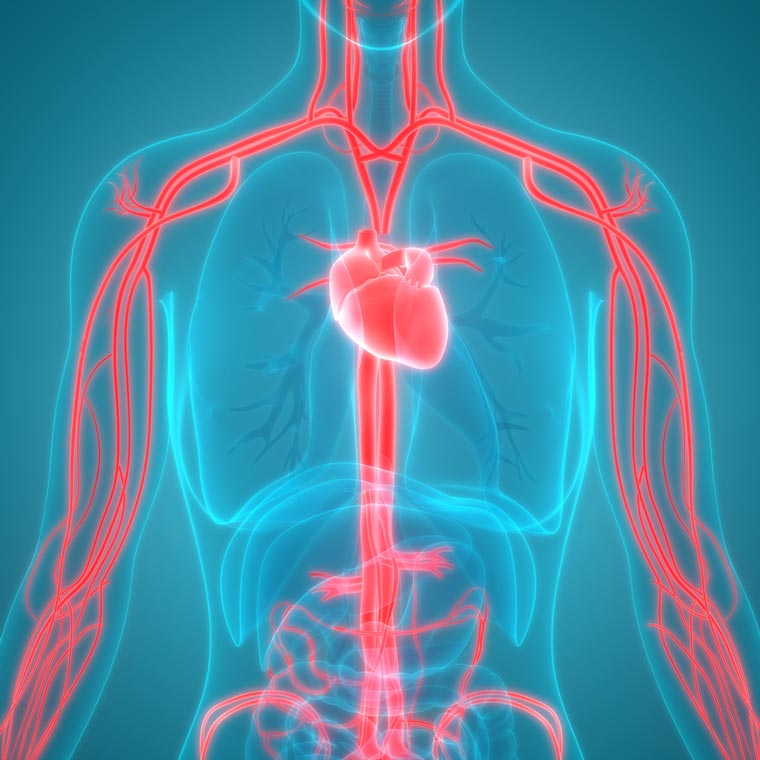Turmeric's Effects on High Blood Pressure and Cholesterol

High blood pressure and atherosclerosis are two of the most common heart conditions affecting millions of people. Both make blood vessels unhealthy, are risk factors for each other, and can cause even more serious heart damage. (vii.202, 203)
How Do Turmeric Compounds Help?
Conversely, compounds that help keep arteries clear and healthy promote efficient blood circulation. Turmeric and its compounds can help counteract and even reduce the factors that make arteries unhealthy and cause high blood pressure: (vii.1, 22, 195, 199, 201, 209)
| Turmeric Compound | What It Does |
|---|---|
| 1,8-cineole (vii.29) |
↓ Inflammatory protein that promotes atherosclerosis. (vii.34, 45) ↓ Cholesterol levels. (vii.71, 137) |
| Alpha-linolenic acid (vii.18) |
↓ Proteins involved in cholesterol production. (vii.70) ↓ Inflammatory proteins that promote atherosclerosis. (vii.18, 21-22, 31, 34, 44, 46) ↓ Triglyceride levels. (vii.22) ↑ HDL levels. (vii.22) ↑ Transport of cholesterol out of macrophages so it can be excreted. (vii.210) ↓ High blood pressure. (vii.38) ↓ Development of atherosclerosis. (vii.22) |
| Alpha-Terpineol (vii.20) |
↑ Relaxation of blood vessels in an animal model of high blood pressure. (vii.205) ↓ Inflammatory proteins that promote atherosclerosis. (vii.22, 34, 45) ↓ Proteins that cause artery constriction (ACE inhibitor). (vii.48, 209) |
| Beta-sitosterol (vii.29) |
↓ Helps reduce the amount of LDL cholesterol that passes from the intestinal tract into the blood. (vii.18, 29, 211) ↓ Enzyme that makes LDL cholesterol. (vii.22) ↓ Inflammatory proteins that promote atherosclerosis. (vii.18, 21, 22, 31, 44) ↓ LDL cholesterol levels. (vii.22) ↑ Effectiveness of statin drugs. (vii.22) Doctors recommend taking 2000-2150 mg/day of phytosterols to help lower LDL cholesterol. (vii.22, 66) |
| Caffeic acid (vii.20) |
↑ Transporter proteins that move cholesterol out of macrophages so it can be excreted. (vii.210) ↓ Cholesterol. (vii.48) ↓ AGEs, including the enzymes that help form these heart and artery-damaging molecules. (vii.204) ↓ Inflammatory proteins that promote atherosclerosis. (vii.22, 34, 48-50) |
| Curcumin |
↑ Proteins that help regulate cholesterol metabolism and transportation. (vii.210) ↓ Free fatty acids, which increase abnormal heart rhythms and risk of sudden cardiac death. (vii.1, 113) ↓ Enzyme that makes LDL cholesterol. (vii.22) ↑ Transporter proteins that move cholesterol out of macrophages so it can be excreted. (vii.210) ↓ Inflammatory proteins that promote atherosclerosis. (vii.21, 31, 34, 44, 49, 51-53, 168) ↑ AGE receptors, which helps get rid of artery-damaging AGEs. (vii.204) ↓ Unhealthy LDL and triglyceride levels. (vii.1, 212) ↑ HDL cholesterol levels in both the blood and liver. (vii.212) ↑ Enzymes that help arteries dilate, keep them healthy, and help prevent hypertension. (vii.193) ↓ Artery-clogging lesions that are a sign of atherosclerosis, even with a high-cholesterol diet. Curcumin's protective activity was comparable to the cholesterol drug lovastatin. (vii.212) ↑ Antioxidant enzymes naturally produced in the body. Recently published research found that one of them, glutathione peroxidase, significantly reduces the risk of heart disease in people with low levels of HDL cholesterol. People with low HDL and low levels of this antioxidant are at much higher risk of heart disease, which can cause heart attacks and strokes. (vii.206, 207) ↓ Unhealthy effects of obesity on the heart. (vii.1) ↓ Dangerous remodeling and enlargement of heart muscle (caused by heart disease or a heart attack) that can cause heart failure and death. (vii.193) Doctors recommend patients with high cholesterol consider taking 500-2000 mg/day of curcumin (divided in 2 even doses). (vii.22, 66) |
| Farnesol (vii.72) |
↑ Proteins that help regulate fat metabolism and storage. (vii.209) ↓ Enzyme that helps produce cholesterol. (vii.22) |
| Ferulic acid (vii.47) |
↓ Inflammatory protein that promotes atherosclerosis. (vii.34, 54) ↓ Proteins that cause artery constriction (ACE inhibitor). (vii.48, 213) ↑ Transporter proteins that move cholesterol out of macrophages so it can be excreted. (vii.210) ↑ Antioxidant vitamin E levels. (vii.22) ↑ Dilation of arteries. (vii.48) ↓ LDL cholesterol and triglycerides. (vii.22, 213) ↓ Arrhythmia, associated with increased risk of sudden cardiac death. (vii.1, 48) |
| Gamma-terpinene |
↓ Proteins that cause artery constriction (ACE inhibitor). (vii.48) |
| Geraniol (vii.56) |
↓ Inflammatory proteins that promote atherosclerosis. (vii.34, 45) ↓ Cholesterol levels. (vii.64) |
| Limonene (vii.20) |
↓ Inflammatory proteins that promote atherosclerosis. (vii.34, 45) ↓ Cholesterol levels. (vii.139) |
| Linoleic acid (vii.39) |
↓ Cholesterol. (vii.48) |
| Magnesium (vii.105, 106) |
↓ Dysfunction of blood vessel cells. (vii.106) ↑ Dilation of blood vessels. (vii.106) ↓ High blood pressure. (vii.106) ↑ Effectiveness of hypertension drugs. (vii.106) |
| Myricetin (vii.25) |
↓ Proteins that cause chronic inflammation (which promotes atherosclerosis). (vii.22, 34, 49, 57, 174) |
| Niacin (vii.29) |
↓ Enzyme that helps make cholesterol. (vii.22) ↓ Free radicals that damage artery walls. (vii.2) ↓ Inflammatory proteins that promote atherosclerosis. (vii.22, 31, 34, 44, 58, 59) ↑ Transporter proteins that move cholesterol out of macrophages and fat cells so it can be excreted. (vii.210) ↑ Proteins that help regulate cholesterol metabolism and transportation. (vii.210) ↓ LDL, especially small dense types of LDL. (vii.22) ↓ Triglyceride levels. (vii.22) ↑ HDL levels. (vii.22) Doctors in India note that niacin's anti-cholesterol effects are substantial at doses of 4000 mg/day, while doctors in the U.S. recommend 500-4000 mg/day. (vii.22, 66) |
| Quercetin (vii.25) |
↓ Proteins that cause chronic inflammation (which promotes atherosclerosis). (vii.22, 26, 34, 49, 50, 174) ↓ Free radical promotion of atherosclerosis. (vii.111) ↑ Dilation of blood vessels. (vii.48) |
| Resveratrol (vii.27) |
↓ Triglyceride levels. (vii.22, 28) ↓ Proteins that cause chronic inflammation (which promotes atherosclerosis). (vii.22, 34, 49, 174) ↑ HDL levels. (vii.22) ↑ Transporter proteins that move cholesterol out of macrophages so it can be excreted. (vii.210) ↓ Formation of plaque-promoting foam cells. (vii.210) Doctors recommend 250 mg/day of resveratrol to help treat unhealthy cholesterol levels. (vii.66) |
|
Turmerones and Curlone (vii.20, 29)
(in turmeric's essential oil) |
↑ Antiplatelet activity, which can help prevent dangerous clots that can cause stroke or other cardiovascular damage. (vii.211) |
| Vitamin C |
↓ Inflammatory proteins that promote atherosclerosis. (vii.34, 61) ↓ Free radical promotion of atherosclerosis. (vii.111) Doctors recommend 500 mg/day to help normalize cholesterol levels. (vii.66) |
| Vitamin E (vii.29) |
↓ Inflammatory proteins that promote atherosclerosis. (vii.34, 61) |
In an animal study, borneol by itself caused a harmful drop in blood pressure in rats with normal blood pressure. However, other studies suggest borneol and niacin in turmeric can also help regulate low blood pressure. (vii.71, 215)
Clinical Studies

| Form & Dosage | Study Details | Take Away Point |
|---|---|---|
|
Turmeric Supplements 500 mg 3 times (1500 mg total) daily for 3 months |
54 patients with slightly elevated cholesterol levels were assigned to take either a turmeric supplement or a placebo. Results of the clinical trial showed that turmeric: (vii.216)
|
Turmeric could improve cholesterol ratios in people with mildly high cholesterol over time. (vii.216) |
|
Turmeric Supplements 500 mg 3 times (1500 mg total) daily with meals for 3 months. |
24 patients with systemic lupus erythematosus and kidney disease were assigned to take either a turmeric supplement or a placebo. (vii.217) Results of the clinical trial showed that turmeric significantly lowered systolic blood pressure compared to baseline measurements. Conversely, the placebo did not have any significant effect on patients who took it. (vii.217) |
Turmeric could lower blood pressure in people with lupus and kidney disease. (vii.217) |
|
Turmeric Supplements 3 grams/day for 12 weeks. |
Tests done in a clinical study done on turmeric's ability to cure stomach ulcers revealed some interesting cholesterol data. 4 weeks into the study, blood work on the 25 study patients showed an average reduction of triglyceride levels of almost 33%, with only a tiny reduction in total cholesterol levels (.007%). (vii.187) All patients had cholesterol levels (both total and triglyceride) within normal ranges prior to taking turmeric. However, the average triglyceride level was at the upper end of the normal range. Could the drop in triglyceride cholesterol be attributed to of turmeric? (vii.187) The study's authors didn't address the data since their focus was on turmeric's anti-ulcer effects. Results from other studies suggest its possible turmeric might have had some unintended beneficial side effects in this clinical trial. (vii.187, 218) |
Moderately high doses of turmeric could help lower triglycerides in people with normal total cholesterol. (vii.187) |
|
Longvida® Turmeric 400 mg (containing 80 mg curcumin) a day for 4 weeks. |
In a clinical trial, 38 healthy adults aged 40-60 years old were randomly assigned to take either a Longvida® turmeric or placebo daily. The turmeric supplement significantly: (vii.218)
Longvida® turmeric increased levels of a certain enzyme once thought to be a sign of increased risk for acute coronary syndrome. However, there was no concurrent increase in inflammatory markers typically linked to this enzyme. (vii.218-219) Turmeric also reduced signs of liver injury and beta amyloid proteins that promote neurodegenerative conditions such as Alzheimer's disease. (vii.218) |
Turmeric with extra curcumin may help reduce risk factors for high blood pressure in middle-aged adults. (vii.218) |
|
150 mg/day for 8 weeks combined with exercise. |
In a clinical trial 45 postmenopausal women were randomly assigned to take either curcumin supplements or a placebo daily. Results showed: (vii.196) Curcumin combined with exercise significantly lowered one blood pressure measurement of artery health. Combined treatment may work better than either exercise or curcumin alone. |
Curcumin and exercise may help prevent high blood pressure in postmenopausal women. (vii.196) |
|
Curcumin Compounds 300 mg daily for 1 week |
Curcumin supplements had the following effects on 10 healthy adults aged 24-45 in an open clinical study: (vii.220, 221) ↑ HDL by 29%. ↓ Total cholesterol levels by 11.63%. ↓ Lipid peroxide levels by 33%. Lipid peroxides are products of free radical damage to cell membranes. |
Low doses of turmeric's curcumin compounds could improve cholesterol levels in healthy younger adults. (vii.220) |
|
Curcumin Compounds 100 mg 3 times daily after meals. |
Heart disease patients were randomly assigned to take either curcumin or Lipitor® for this 6 week clinical trial. Results showed that curcumin significantly: (vii.53)
|
Low dose curcumin works similarly to Lipitor® in people with heart disease. (vii.53) |
|
300 mg twice daily for 8 weeks. |
72 patients with type 2 diabetes were randomly assigned to take either curcumin or atorvastatin. Results of this comparative clinical trial showed curcumin had the following effects: (vii.52, 222)
|
Turmeric's curcumin compounds may help improve cardiovascular health in type 2 diabetics. (vii.52) |
|
Curcumin Compounds 300 mg/day for 3 months. |
In a clinical trial involving 100 overweight/obesepatients with type 2 diabetes, patients were randomly divided into 2 groups, one of which was given curcumin supplements while the other was given a placebo. (vii.113) Neither the patients nor the researchers knew which group each patient was in until the study was completed. Turmeric's curcumin compounds had significant anti-cholesterol activity: (vii.113)
Curcumin also significantly reduced blood sugar levels (including fasting glucose). (vii.113) |
Low doses of curcumin could reduce fatty acids and triglyceride levels in obese patients with type 2 diabetes. (vii.113) |
|
Curcumin and Piperine Supplements 1000 mg/day curcumin combined with 10 mg/day of piperine for 12 weeks. |
118 patients with type-2 diabetes were randomly assigned to take either a curcumin/piperine supplement or a placebo. The clinical study was also double-blinded, meaning neither the researchers nor the patients knew if they were taking the curcumin or the placebo until the end of the trial. (vii.324) Blood tests revealed promising results for those who took the curcumin and piperine. The group given supplements showed increased HDL cholesterol and significant reductions in 2 markers for heart disease: non-HDL-C and lipoprotein (a). (vii.324) This is important because: |
Moderate doses of curcumin, combined with piperine, could reduce the risk of heart disease in people with type 2 diabetes. (vii.324) |
|
Curcumin Compounds 1 g/day for 30 days. |
In a randomized, double-blind, placebo-controlled clinical trial involving 30 obese patients, curcumin: (vii.44, 223)
|
Moderate doses of curcumin could reduce triglyceride levels within a short time in obese patients. (vii.223) |
|
C3 complex® 1000 mg/day for 8 weeks |
100 patients with metabolic syndrome were randomly assigned to take either the curcumin and piperine supplement or a placebo. Results of the clinical trial showed that the enhanced turmeric compound had significant affects over placebo: (vii.321)
Had no significant effect on serum small dense LDL levels compared to the group of patients who took the placebo. (vii.321) |
Curcumin with piperine to enhance bioavailability could improve cholesterol ratios in people with metabolic syndrome. (vii.321) |
Join the 1000s of People Who Are Discovering the Benefits of Turmeric.

Healthceuticals® Turmeric Curcumin Complex
100% Certified
Organic ingredients
- Organic Turmeric Extract - standardized to 95% curcuminoids.
- Organic Whole Turmeric - provides full spectrum antioxidant, anti-inflammatory turmeric benefits, including turmerones and numerous vitamins, minerals, and phytonutrients
- Organic Black Pepper Extract - standardized to 95% piperine; dramatically enhances bioavailablity.
- Organic Phospholipids - markedly improve absorption.
- Organic Ginger - works synergistically with turmeric to provide more powerful benefits.
- Absolutely FREE of potentially harmful additives and fillers such as magnesium stearate.




